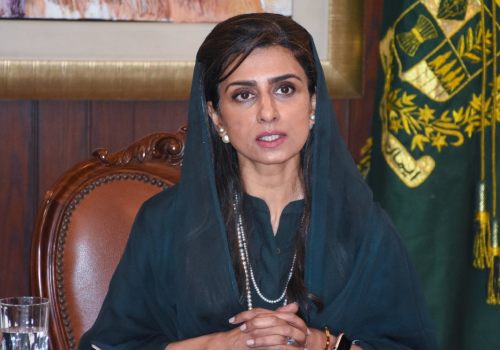ISLAMABAD: Amidst the growing global rivalry between the United States and China, Minister of State for Foreign Affairs, Hina Rabbani Khar, emphasized that Pakistan is not interested in picking sides between the two powers.
In an interview with European news outlet POLITICO, Khar stated that Islamabad is apprehensive about the potential fallout of a complete rupture between the US and China.
“We are highly threatened by this notion of splitting the world into two blocs,” Khar expressed concern. She further highlighted that Pakistan is deeply concerned about any decoupling or developments that may further divide the world.
“We have a history of being in a close, collaborative mode with the US. We have no intention of leaving that. Pakistan also has the reality of being in a close, collaborative mode with China, and until China suddenly came to everyone’s threat perception, that was always the case,” Khar added.
Front-line states closely monitor Pakistan in the contest for strategic influence in Asia. Over the years, as Washington’s cooperation with India has increased, Pakistan has forged closer ties with China, especially after the latter’s investment in the China-Pakistan Economic Corridor (CPEC). While Washington remains a significant military partner for Pakistan, Beijing has recently pledged to deepen economic investment and military cooperation with the country.
In April of this year, Khar made headlines when leaked records, termed Discord Leaks, revealed a discussion between her and Prime Minister Shehbaz Sharif. In those documents, Khar advised Pakistan to avoid appeasing the West and stated that maintaining a strategic partnership with the US would compromise the full benefits of its longstanding friendship with China.
During the interview with POLITICO, Khar declined to comment on the leaked records but criticized the US for being “unnecessarily” fearful and defensive about its global leadership position. She argued that Pakistan’s partnership with the US remains crucial in areas such as healthcare, technology, trade, and combating climate change.
“I don’t think the leadership role is being contested until they start making other people question it by being reactive,” Khar remarked. “I believe that the West underestimates the value of its ideals, soft power,” she added, emphasizing Washington’s role as a global standard-setter.
Khar also emphasized that China’s significant selling point for Pakistan is its economic model for lifting a vast population out of poverty.
Regarding Afghanistan, Khar expressed concern about Washington’s policy, which aimed to weaken the Taliban but resulted in a humanitarian and security crisis. She criticized Prime Minister Imran Khan’s reaction to the Taliban’s seizure of power in Kabul in 2021 as “rather immature.” Khar stated that Pakistan is taking a diplomatic approach, seeking to engage with the Taliban politically and focusing on economic development rather than strong-arm tactics.
She rejected the idea that any other country could assist Pakistan in defeating the Taliban through military deployments, stating, “When it comes to boots on the ground, we would welcome no one.”
When asked about the stalled bailout program from the International Monetary Fund (IMF), Khar was asked if she believed that Washington was withholding support for Pakistan to test whether China would step up and play a bigger role in ensuring the country’s stability. In response, she said, “I would be very unhappy if that were the case.”
Furthermore, Khar expressed wariness about Europe’s role in the Indo-Pacific region and the naval dimensions of EU plans, particularly in relation to containing Chinese power in collaboration with India. She urged Europe to tread carefully in calibrating its plan for the region, stating, “[If it’s] a containment strategy of a certain country, which then courts a certain country that is a very belligerent neighbor to Pakistan, then instead of stabilizing the region, it is endangering the region.”
(Islamabad51-Newsdesk)














